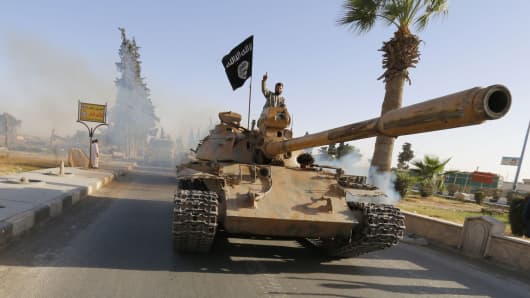For the next U.S. president, no foreign policy choice will be more important than deciding whether and how to end a stalemate of conflict in the Middle East. The challenges will be daunting. But turning a blind eye to the region's deteriorating realities will ensure that the dangers and threats only grow.
Terrorist attacks in the past weeks claiming hundreds of lives in Iraq, Saudi Arabia, and Turkey underscore that the fundamental dynamics of instability and conflict persist. Russia has emerged as a regional and complicating force. Syria's crisis has grown more acute. Iran will entrench further in Syria. Iraq is challenged to hold together as a state. ISIS has spread its reach of terror as territorial claims to a caliphate slip out of its hands.
The consequences flow far beyond the Middle East. Fear of Syrian refugees tipped frustration with EU bureaucracy into a Leave victory in the UK. Nationalist parties have surged (again) in Austria and France. ISIS sponsored the recent carnage in Bangladesh and potentially inspired the massacre in Orlando.
World-wide, energy consumers will likely pay as well - with the return of a risk premium to the price of oil. A global oversupply since 2014 erased the market impact of political risk. ISIS' advance on Baghdad two years ago sent prices spiraling up. But, more recently, ISIS attacks in Baghdad, Paris, Egypt, Turkey, the United States, and Belgium did not raise oil prices.
This insulation of oil prices from risk volatility is bound to change now that oil demand growth will outstrip growth in supply in the next year. No one can predict the range of volatility, but we can predict that the politics of oil will become more acute when consumers pay more at the pump.
Whomever the victor in the U.S. elections, the next administration must put geopolitical shrewdness ahead of self-affirming rhetoric if it wants to change the balance of forces driving the downward spiral of conflict in the Middle East. Here are six realities that a President Clinton or Trump will have to face and redress:
- Syria is worse off today than in September 2015 when Russia entered the military fray. Having suffered massive losses from Russian aerial support for Syrian President Assad, the short-lived February ceasefire gave the Syrian opposition a fleeting respite. Violence has resumed with fury.
- ISIS has been weakened, not defeated. In western Iraq, territory has been reclaimed, but no entity holds authority. U.S. support for Iraqi Security Forces has displaced ISIS from control of several major cities, but ISIS still roams as an insurgent force. Patronage and weapons from Baghdad have secured cooperation from Sunni militias but not a commitment to govern constructively. Take away U.S. air support, and this tenuous balance collapses.
- Russian President Vladimir Putin has emerged tactically triumphant. Russia steadied a crumbling Assad regime, cemented territorial gains, and cast itself as peacemaker and power broker. For President Putin, forcing President Obama to accept a role for Assad in Syria's political transition – and engage in dialogue with Russia – is a vindication that reinforces Russia's position against "regime change."
- Iran's core regional interest is to support Hezbollah in Lebanon and against Israel. Assad has channeled weapons, forces, and resources at Iran's behest. Russia's support for Assad gives an overstretched Hezbollah space to regroup. For Iranian President Hassan Rouhani, there is a perverse interest to encourage the Islamic Revolutionary Guard Corps (IRGC) to battle ISIS regionally in a bid to reduce IRGC resistance to his domestic economic reforms.
- Iraq struggles to manage itself as a state. Cleric Muqtada al-Sadr ended his campaign to unseat Prime Minister al-Abadi, yet he still secured a cabinet reshuffle. Iraq is in a fiscal crisis, forcing Baghdad to reduce transfers to regional provinces. For now, the imperative to fight ISIS may defer a descent to looser federalization.
- the U.S.-Saudi relationship has deteriorated deeply. Obama's April visit to Saudi Arabia faced a mountain of accumultated umbrage: perceived indecisiveness in Syria, the nuclear deal with Iran, public comments characterizing the Gulf states "as free riders"—with a U.S. Congress seeking legislation to allow Saudi Arabia to be sued in U.S. courts. Yet Saudi Arabia is a regional power with global impact. Since 2014, Saudi oil policy has stripped control from OPEC to allow markets to drive prices. With the prospective IPO for Saudi Aramco and its new "Vision 2030," Saudi Arabia plans a radical transformation, challenging the outside world to cooperate.


